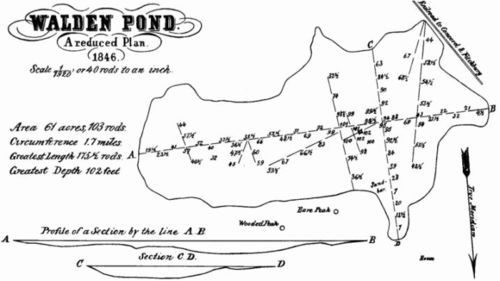
Thoreau's deductive reasoning

"While men believe in
the infinite some ponds will be thought to be bottomless," wrote
Thoreau. Then he spent the remainder of chapter 16 telling how he
surveyed the bottom of Walden pond.
Not only did Thoreau
determine that the body of water did indeed have a bottom (and no "vast
holes 'into which a load of hay might be driven'"), the chapter also
walked us through an excellent example of the scientific method.
Thoreau started by using keen observation to develop a hypothesis:
Step two of the
scientific method was using this observation to come up with a
hypothesis --- in this case, that the deepest spot in any pond can be
pinpointed using the method above. Next, Thoreau set up an
experiment to test his hypothesis. He used a map to estimate
where he thought the deepest point in another pond should lie, then
surveyed that pond and found his estimate close to the mark.
Of course, Thoreau would
have needed to survey quite a few more ponds to thoroughly test his
hypothesis. But it's handy to be reminded that deductive
reasoning is a very important skill to have, especially if you're a
homesteader trying to partner
with the natural world. Why are the bean beetles so much
worse than they've been in previous years? Is your neighbors'
advice spot on or is it an old wives' tale? If I were building a
curriculum for homesteaders to be, deductive reasoning would be
presented in week one.
 If you're new to the book
club, you might want
to check out the thought-provoking comments on
chapter
1, chapter
2, chapters
3 and 4, chapters
5 and 6, chapters
7 and 8, chapters
9 and 10, chapters
11 and 12, and chapters 13 and
14. We'll
be discussing the last two chapters of Walden next week, and will then
be taking a week off before diving into The
Dirty Life. Don't forget to start hunting down a copy of the
next book (which is a much lighter read, I promise) ASAP.
If you're new to the book
club, you might want
to check out the thought-provoking comments on
chapter
1, chapter
2, chapters
3 and 4, chapters
5 and 6, chapters
7 and 8, chapters
9 and 10, chapters
11 and 12, and chapters 13 and
14. We'll
be discussing the last two chapters of Walden next week, and will then
be taking a week off before diving into The
Dirty Life. Don't forget to start hunting down a copy of the
next book (which is a much lighter read, I promise) ASAP.
Want more in-depth information? Browse through our books.
Or explore more posts by date or by subject.
About us: Anna Hess and Mark Hamilton spent over a decade living self-sufficiently in the mountains of Virginia before moving north to start over from scratch in the foothills of Ohio. They've experimented with permaculture, no-till gardening, trailersteading, home-based microbusinesses and much more, writing about their adventures in both blogs and books.
Want to be notified when new comments are posted on this page? Click on the RSS button after you add a comment to subscribe to the comment feed, or simply check the box beside "email replies to me" while writing your comment.

I have so enjoyed reading the pond-surveying ch. today, with memories of 4th of July times past at College Pond! I wanted to comment thru the blog, but will here, instead, because, maybe due to imminent thunderstorm, I can't get the comment page to pop up! [Editor's note: Mom emailed this to me, so I put it up for her.]
First, I have to say that, tho I was happy to refresh my knowledge of deductive reasoning, if Thoreau were online right now, what I would say to him is: "Didn't you learn at all about the glacial ponds of Massachusetts? I did, in 7th grade, from a 20-30-yr old geology science book written for Boston schools! (I wonder when the knowledge of the glacial age's causing all the Massachusetts spring-fed ponds began to be used in the Boston schools? Probably after Dewey reformed how children are taught...)" So, I have now that wish (or seed of a "back-to-the future" novel, of testing Thoreau's ability to learn new truths...) And it's fun to realize that I could compare Thoreau to Melville, who writes so factually, in Moby Dick!
I have 2 tales from my own family of going out on the ice, which you know, Anna: One, of my father skating across the Charles River to MIT, as the quickest way for him to get there. The other, of my grandfather Tirrell, maybe that same very cold winter, sometime between 1919 and 1922, driving his car across the ice on College Pond, into which he later sank to its final rest on of the sailboats he'd made. CP, about 1/2 mile wide, was deep enough even in very dry years, not to show the remains of that boat. We were scared to dive too deep to try to find it! I remember so well the cold places we found, swimming, which were supposed to be evidences of springs. I wish Thoreau had wwritten of such discoveries--or maybe I missed that?